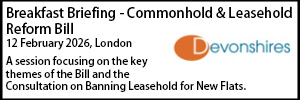The Economic Crime Levy and housing associations
- Details
The Economic Crime Levy (ECL) deadline is approaching – but we should be focusing on its unintended consequences, write Lara Borrett-Lynch and Paul Butterworth.
As we all know there is already huge pressure on local authorities and housing associations (HAs) to deliver much needed affordable housing. Any additional cost will only add to that pressure.
The Economic Crime Levy (ECL) was announced in 2020 and collected its first payments last year. Aimed at raising money to fund a crackdown on money laundering, it affects organisations who are supervised under the Money Laundering Regulations (MLR) and whose UK revenue exceeds £10.2 million per year. A return is due to be submitted on 30 September to cover each previous financial year for those organisations covered by ECL with the duty being due on the same date. Late submission or payment can lead to interest and penalties.
HAs who fall under this revenue bracket are potentially caught by the ECL. There are a number of activities carried out by HAs which may be caught with "Estate Agency" being the main area of concern. The definition of this is widely drawn. HAs involved in the resale of shared ownership properties are for example likely to be caught, this activity falling within the Estate Agency category giving rise to ECL.
A law of unintended consequences?
There is no doubt that any law designed to crack down on money laundering is laudable. It is doubtful however that this was ever designed to capture affordable housing providers in the ECL web. However, it does seem odd if HAs helping those most in need and subject to strict regulation already get caught by ECL when activities caught are proportionally very small against their main operations.
Arguably, this will have a particular impact on smaller HAs delivering affordable housing in in rural areas. These schemes tend to be smaller scale, with a development of say 10-15 houses and possibly being one of a larger rural project in a local authority area but nonetheless important in the context of rural housing shortages. With the added policy and planning restrictions affecting rural developments, any additional cost, in particular for smaller HAs may be enough to affect the viability of development of these schemes.
Whilst local authorities are not directly affected by ECL there may well be a further factor now which affects affordable housing delivery in their areas, leading to less affordable housing delivery.
HAs may be unaware of their need to register and re at risk of facing both fines and reputational damage if they fail to comply with ECL. Any risk of breaching ECL, albeit inadvertently in most cases, may well lead to curtailment of grant funding if there is a regulatory breach such as this.
What action should be taken?
In its current form, the ECL does not seem proportionate, for certain businesses such as HAs. Measures should be taken to protect the future of affordable housing delivery, such as exempting affordable housing providers from the categories likely to catch them for ECL purposes.
The level of activity should also be looked at if an exemption is not on the table. Resales for example form such a small part of housing association activity it would make sense to have a test which links these activities to the proportion of turnover.
Looking ahead
Although set up with good reason in mind, the ECL lacks clarity and as it stands, adds regulatory pressure. Ahead of the next deadline, it would be good to see more consideration for HAs and ultimately affordable housing delivery in local authority areas by including provisions ensuring affordable housing providers are not caught by ECL.
Unfortunately, it does mean that HAs are likely to be caught this year at least and they should be aware of their activities giving rise to ECL. In addition, they should liaise with local authority partners if there are likely to be consequences in terms of affordable housing delivery in LA areas.
Lara Borrett-Lynch is a Partner and Head of Affordable Housing and Paul Butterworth is a Legal Director at law firm Foot Anstey.

































